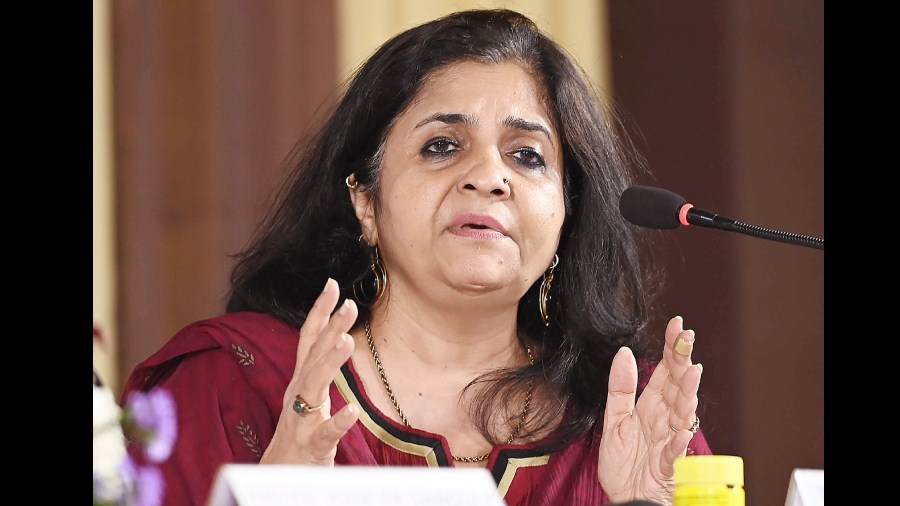Rights defender Teesta Setalvad has said she fears the Narendra Modi government will begin thrusting the “bhayanak shaitan (terrifying devil)” of its contentious citizenship matrix upon the nation from next year, asserting that it could, with the venom of hatred, destroy beyond recognition India’s social fabric.
Setalvad was participating in a panel discussion titled “Indian Constitution and Democracy” at the Kyd Street-based Iran Society here on Saturday evening. She has said where India has apparently descended as a nation now is ignominious and things have come to such a pass only because most of the people and much of the nation remain silent.
“The bhayanak shaitan of the citizenship (tripod) is going to be thrust upon us in 2023-24, that is what I suspect. The CAA (amended citizenship law) was passed illegally in 2019, its rules are yet to be drafted, but in 19 Indian states, counters have already been set up for fast-tracking citizenship for non-Muslim minorities from five neighbouring nations,” said the 60-year-old social activist.
“Without even passing the rules, in some ways, the steps to implement the CAA are already underway,” she added. “In no country on this planet is citizenship determined on the basis of such documentation. Not one other country.”
Setalvad had recently been held in custody for 57 days in an Ahmedabad prison on the charge of falsifying evidence on the 2002 Gujarat riots. She spoke alongside Justice (retired) Asok Kumar Ganguly, academics Ram Punyani and Ratan Khasnabis; and actor Badshah Moitra. The panellists unanimously voiced anxiety and apprehension over the future of Indian democracy, given the current state of affairs that is resulting in the weakening of vital fundamentals of the Constitution.
The Iran Society is the country’s oldest functioning centre for Persian studies.
Setalvad suspects the two other prongs of the citizenship trident — the National Population Register and the National Register of Citizens — are also not going to be left far behind.
“About the NPR, a notification has come, which says begin the update from January 2023. It is dangerous, because for the first time in the NPR, details of birth registration of forefathers are being sought, which has no place in the census,” she said.
Drawing from her organisation’s extensive experience of working in Assam through the NRC exercise there, Setalvad said it was nothing short of madness.
“Nineteen lakh people in Assam are outside the final NRC and another 2.2 lakh are declared foreigners and doubtful voters by the Election Commission. So, 22 lakh people in Assam today are deprived of citizenship…. Despite there being provisions in the law of the land, how you keep abusing laws so that they are used against the people,” she said.
“When 19 lakh people were declared non-Indians, only 5.5 lakh of them are Muslims. That devastated them (the saffron camp) because their political project was that a vast majority of these people would be Muslims. Now they demand that the NRC be done all over again…,” added Setalvad.
The rights activist underscored how 1.3 crore of the 3.3 crore people of Assam had to go through the NRC exercise at a cost of Rs 1,700 crore to the state exchequer, keeping the state machinery preoccupied with it for a decade. “Now your political demand is that the NRC be done all over again?”
Setalvad urged the people to consider the possibility of the Assam model being replicated on a national scale.
“Just think of the Assam example and consider the possibility of it being replicated across the nation. What kind of social turmoil, complications, what kind of internal feuds would that result in. Everyone, given the urge to protect themselves, would start thinking of others as the enemy…. The poison of hatred might destroy beyond recognition,” she said.
“It is being done only with the objective of making certain sections of people the target, maybe even to keep a gigantic labour pool ready for industry…. I don’t know for sure. Detention camps of 300 acres are being built. One cannot say with certainty what the exact objective is. But a terrifying attitude one is able to see clearly, ahead of us. We should be alert to this, be sensitive to this,” she said, adding that it was being done because the regime sought only to use polarisation for retaining power, diverting attention from the real issues — such as the deplorable state of healthcare and education— and facilitating the silenttransfer of state resources toprivate players.
Setalvad spoke at lengthabout hate as a state project,as a media design and as a political tool, stressing the needfor understanding what wentbehind the scenes for monthsbefore the first stone was pelted in a riot.
“There is this pyramidof hate. Prejudiced attitudesat the base, then acts of prejudice, then discrimination,after that violence, finally genocide,” warned Setalvad.
“If we are able to be alertfrom the early stages and takethe necessary steps, whatever possible, from complaintsbefore authorities to demonstrations. There are manyoptions available, althoughthere are risks… but are wewilling to do the needful andorganise against this, despitethe risks?” she asked. “Thesediscourses are good, but wehave to convert these into action, take steps and declare before the authorities, the police,public spaces that we too aresoldiers of our nation’s Constitution.”










